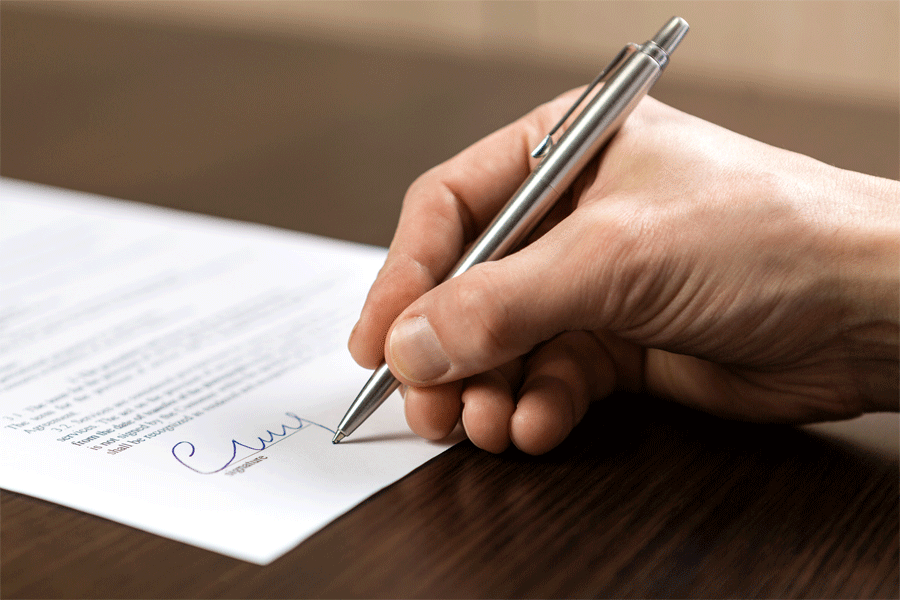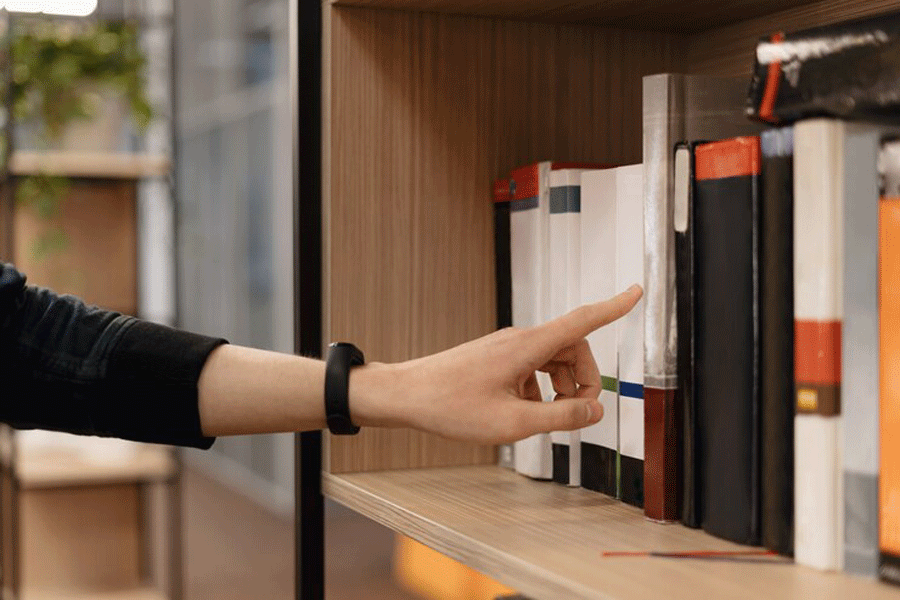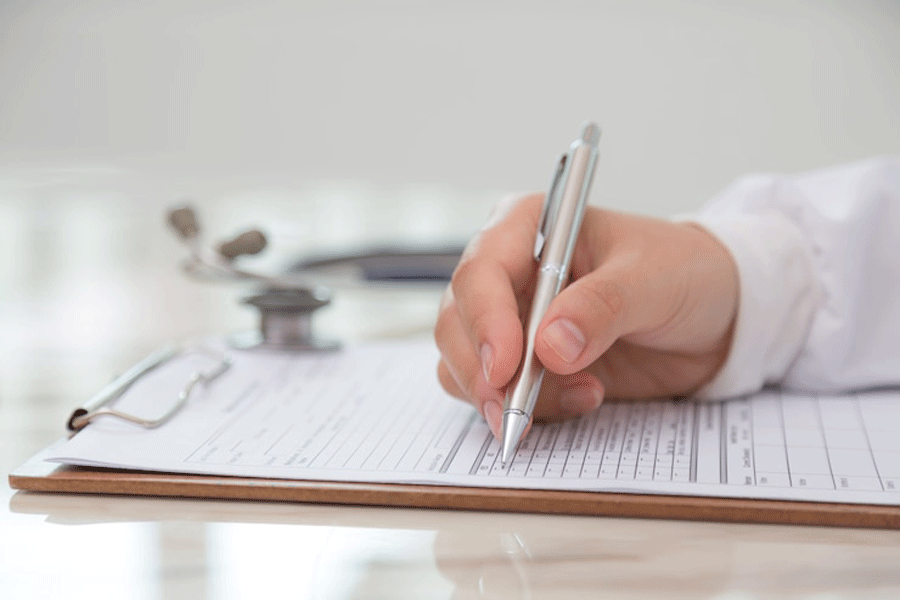A permission letter to take the exam is an official letter written by a student who seeks to get permission from the school authorities to sit for their exam. It should be written in a formal way that observes the standard way of writing official letters.
As a student, taking or sitting for exams is an important part of attending school. There are times when you might need to seek permission before you can sit for your exams. It may be because you were not present when other students were taking the exams. In other cases, it may be because you do not meet the required regulations for taking an exam.
Whatever the case, you need to keep in mind that, in such situations, it is important to write a permission letter. That means that you need to learn how to write a letter. As a student, verbally asking for permission is not as effective as writing a letter.
With this letter, you will not only have formally requested permission but will also have a record for future reference. Also, this letter will increase the chances of the recipient of your letter (school authorities) giving you the permission you need to sit for your exams. It is formal and more persuasive than a verbal agreement.
Free Templates
As a student looking for permission to take an exam, the best way to obtain it is by writing a letter. You can either follow the steps explained below or use a template to write a convincing and effective letter. You can access templates here. They can be customized to suit your needs.
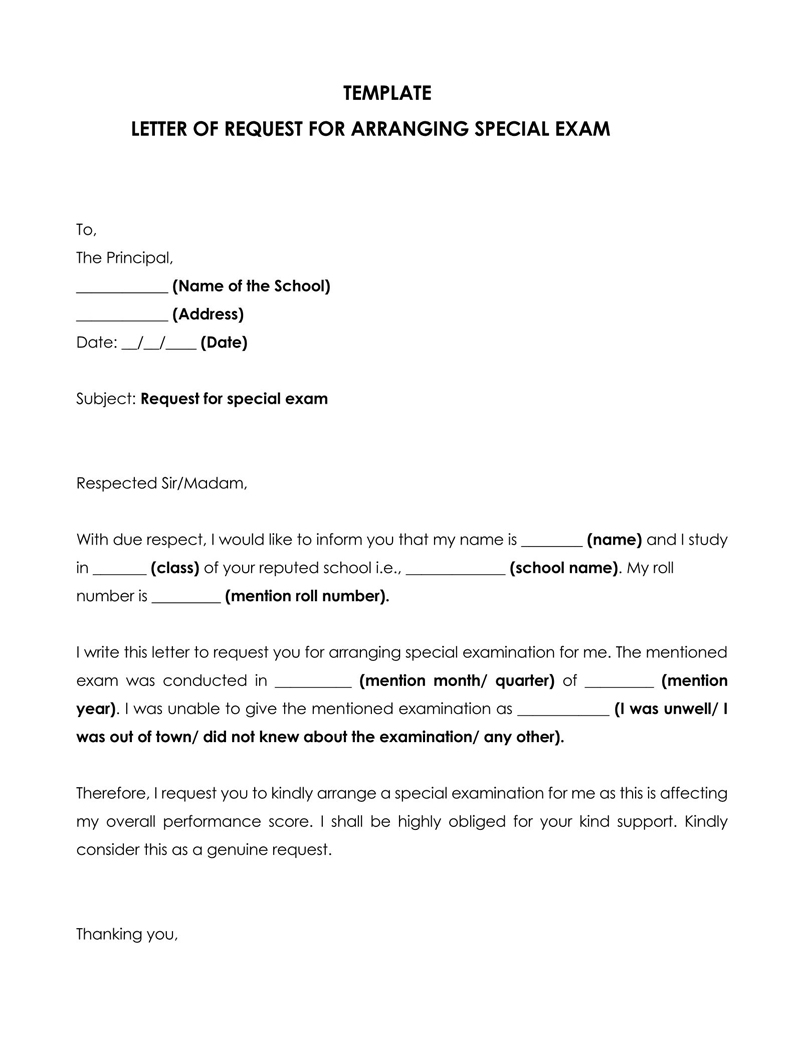
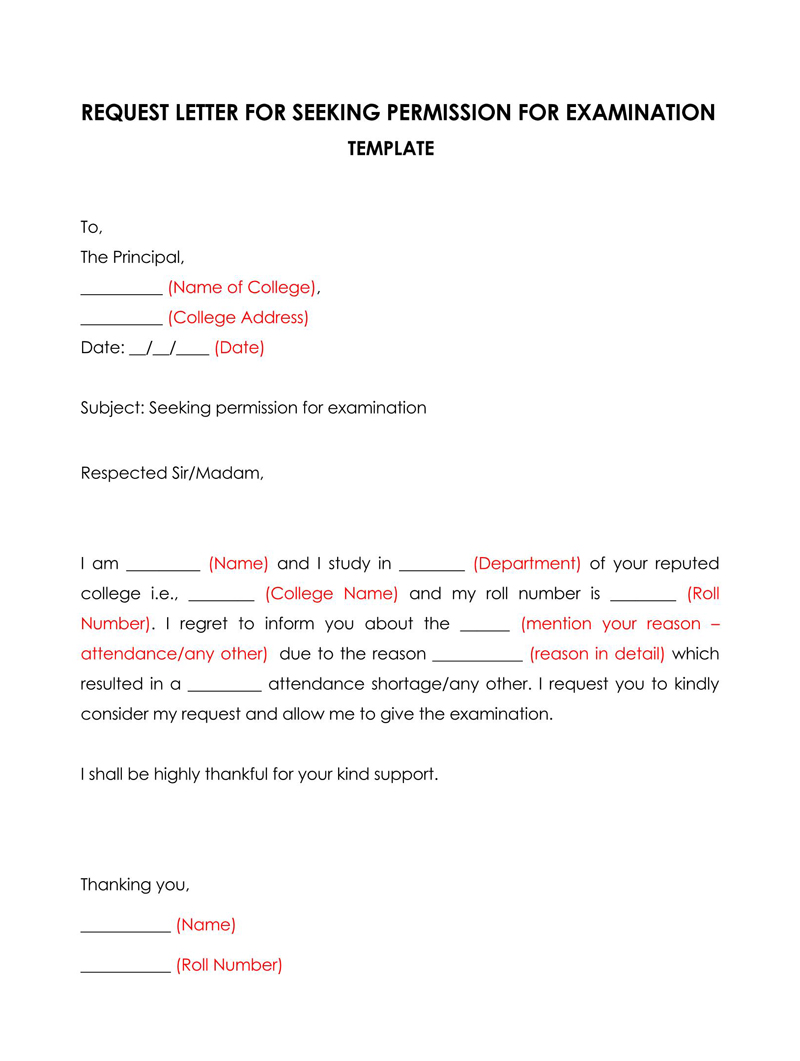
How to Write a Permission Letter to Take the Exam
Below is a step-by-step process for writing the letter to take the exam. With these steps, you will know how to write an effective letter that will help you get the permission you need.
Take a look at these steps to ensure that all the required information is included in the letter:
Step 1: Address the letter
The first step is to address the letter by including your address as the student/sender and the address of the recipient/school authority. If both you and the receiver of the letter are familiar with each other, you can’t avoid writing the sender’s address. The address contains information like your name, contact details, the name of the recipient, their title, and the name of the organization/school.
Step 2: Include the date
You also need to include a date that will help identify when you sent the letter. Including the date helps with record keeping and makes the letter formal, as it is a standard part of an official letter.
Step 3: Add a subject line
Your letter should also have a subject line that is not too short or too long. The subject line should contain at least 6 to 7 words. The subject line is meant to highlight the reason for writing the letter, which, in this case, is to ask for permission to take exams.
Step 4: Write a salutation
As a standard rule of business or formal letters, you must include a salutation or greeting meant for the recipient of the letter. It is best to use the phrase “Dear” followed by their title, such as “Mr. /Mrs. /Ms.” and then their last name.
Step 5: Briefly introduce yourself
The introduction part of the letter is all about introducing yourself to the recipient of the letter. You should mention your name and provide any other relevant information that would help to explain who you are to the recipient.
Step 6: Write the body of the letter
For the body of the letter, focus on the following details and ensure that you expand them appropriately and correctly.
State the purpose of writing this letter
Expand the information you provided in the subject line politely and professionally. Explain to the recipient of the letter how you need to obtain permission so that you can sit for the exam.
Include details of the exam you want to take
Mention the exam that you need to take and other relevant details about the exam. You can include the subject, the department, the teacher or lecturer responsible, and the day the exam is to be held.
Give reason(s) why you want to sit in the exam
You should also mention the reasons why you need to sit for the exam mentioned. Ensure that you focus on the permission you need to obtain so that you can provide valid and compelling reasons that will help you obtain permission.
Step 7: Close the letter
At this point in the letter, it is time for you to close the letter.
Your conclusion part should contain the following:
Ask the recipient to consider your request
You can finish your letter by asking the recipient of the letter to take your request into consideration. You can also mention that you are looking forward to furthering communication with them. Finally, ensure that your conclusion is positive and remains professional.
Sign off
After the concluding phrase or paragraph, you should sign off on your letter. It is standard to do so when it comes to formal letters like a permission letter. Always remember to use professional phrases like “Sincerely,” followed by your name as the student and any other relevant contact information.
Template for Permission Letter to take Exams
[Your Full Name]
[Your Address]
[City, State, Zip Code]
[Email Address]
[Phone Number]
[Date]
[Recipient’s Name/Title]
[Institution’s Name]
[Institution’s Address]
[City, State, Zip Code]
Dear [Recipient’s Name/Title],
I am writing to formally request permission for [Student’s Full Name], a student of [Grade/Year and Department, if applicable], to take the [Name of Exam(s)] scheduled on [Date(s)] under [specific circumstances requiring permission, e.g., advanced schedule, special accommodations].
Due to [briefly describe the reason necessitating the permission, such as health issues, family emergencies, or special needs], [Student’s Name] is unable to take the exam as originally scheduled. We believe that granting this permission will not only help in maintaining [his/her/their] academic progress but also ensure that [he/she/they] remains on an equal footing with [his/her/their] peers.
To support [his/her/their] request, we have included [mention any documents attached, such as medical certificates, letters from doctors or therapists, or any other relevant documentation that supports the request].
We are fully committed to adhering to any guidelines or conditions you may set forth to facilitate this process and ensure the integrity of the examination. We kindly request that you consider [Student’s Name]’s situation with empathy and provide an opportunity for [him/her/them] to complete [his/her/their] examination under conditions that accommodate [his/her/their] current circumstances.
Thank you for your understanding and for considering this request. We look forward to your positive response and are available for any further information or discussion that may be needed to facilitate this request.
Sincerely,
[Your Signature (if sending a hard copy)]
[Your Printed Name]
[Relationship to Student, if applicable]
Sample Letters
Here are a few examples of the letter. You can follow these to write your own:
Sample 01
Subject: Request for Permission to Take Final Semester Exams
Dear Dr. Smith,
I hope this letter finds you well. My name is John Doe, a Junior in the College of Science, majoring in Biology. I am writing to request permission to take the final semester exams scheduled from May 15 to May 29.
Due to unforeseen medical reasons, specifically a prolonged illness, I was unable to meet the attendance requirement crucial for sitting in these exams. I fully understand the importance of these regulations and deeply regret any inconvenience my situation may pose.
Despite these challenges, I am dedicated to my studies and eager to complete these exams to progress to my senior year. In preparation, I have reviewed all lecture materials, completed assignments with the assistance of classmates, and consulted with my professors to ensure I am on track.
I kindly ask for your consideration of my situation and for permission to take the exams. I am prepared to submit any additional documentation required, such as a detailed medical report from my attending physician.
Enclosed are my medical certificates and a letter from Professor Linda Green, who has been advising me academically during my illness. I am hopeful for a positive response and am ready to provide any further information needed.
Thank you very much for considering my request. I am eager to complete my exams and continue my academic progress at Anytown University.
Warm regards,
John Doe
Student ID: 987654321
Sample 02
Subject: Request for Make-up Exams for Emily Gonzalez
Dear Principal Harris,
I hope this letter finds you well. I am writing to you as the parent of Emily Gonzalez, an eighth-grade student in Mrs. Thompson’s homeroom class. Unfortunately, Emily was unable to attend school and participate in the scheduled exams on February 20, 20XX, due to a sudden illness, specifically a high fever and flu-like symptoms, which necessitated medical attention and rest at home.
Understanding the importance of these exams for Emily’s academic progress, we are seeking your kind permission to allow her to take the missed exams at a time that is convenient for the school and does not disrupt the normal exam schedule. Emily has been diligently preparing for these exams over the past few months, and it was with great disappointment that she could not participate on the designated day.
To ensure Emily’s readiness and commitment to complete the missed exams, we have been reviewing the material together, and she has been completing assignments and additional practice problems to reinforce her understanding of the subjects. Emily is eager to demonstrate her knowledge and skills and to make up for the lost opportunity due to her unforeseen illness.
Enclosed with this letter, please find a note from Dr. Susan Lee, Emily’s pediatrician, confirming her diagnosis and recommending rest at home during her period of contagion. We believe that Emily is now well enough to return to school and participate in exams, following any guidelines or precautions you may advise.
We understand the policies regarding attendance and exams and deeply appreciate the school’s efforts to accommodate students who face unexpected health issues. We are hopeful for your understanding and support in allowing Emily to complete her exams, ensuring her academic year is not adversely affected by this unfortunate incident.
Thank you very much for considering our request. We are more than willing to meet and discuss any arrangements or requirements the school might have concerning Emily’s make-up exams. We look forward to your positive response and are ready to provide any further information or documentation as needed.
Warm regards,
Maria Gonzalez
Key Takeaways
Here are a few takeaways that you should follow when writing your letter:
- A permission letter is a formal request from a student to school authorities for permission to take an exam.
- This official letter must contain the sender’s address, recipient’s address, subject line, introduction paragraph, body paragraph, and conclusion.
- In the body paragraph of the letter, you should state the purpose of writing the letter, the exams you want to take, and why you want to take these exams.
- You can use the step-by-step guide or our templates to write your letter.




